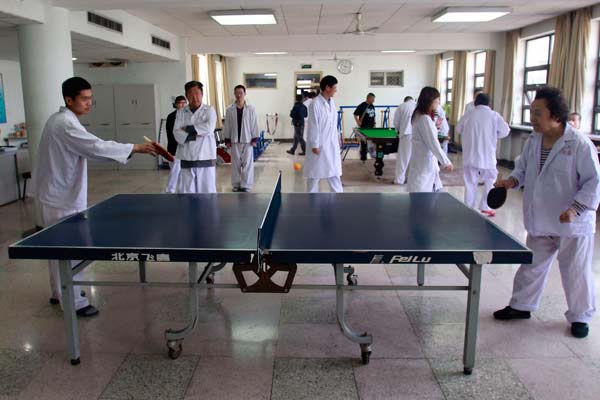Landing a job for mentally challenged a tough task
|
 |
|
Table tennis is a favorite recreational activity for mental health patients at Anding Hospital in Beijing. Feng Yongbin / China Daily |
Cao Mingquan said he had four jobs since 2005, but none of them lasted long.
Cao, 39, was diagnosed with schizophrenia in 2003 and found work while he was recovering at home in 2005, selling MP3s in a shopping mall. But he quit after he quarreled with other salesmen.
He later became a real estate agent, but that just lasted for a month. He then worked as a clerk in two supermarkets. One closed down, and the other fired him when it found out about his condition as he suffered a relapse.
Living on a government subsidy and support from his parents, Cao is in a training program in Beijing's Changping district, which helps people who are mentally challenged recover at home.
Anding Hospital, a mental health hospital in Beijing, adapted a rehabilitation program developed by experts in the United States and introduced it to the city.
"It is designed to help people manage regular medication, monitor their own mental health condition and improve their social interaction before they eventually get a job and become financially independent," said Sun Lihong, a psychiatrist and one of the trainers.
For Cao, these skills are vital.
"I am at a loss on how to communicate with others," said Cao, who hopes to be a bus or taxi driver.
However, his doctor told him he may never be able to do his dream job due to the medication he takes, which can make him drowsy.
Guo Hongli, a doctor in Anding Hospital who takes part in monitoring the program, said it takes much more than a single program to help people recover from mental challenges to get a job.
According to Guo, there are between 70,000 and 80,000 people living with severe mental disorders in Beijing, including 40,000 registered with schizophrenia.
"From my experience, no more than 10 percent of them can be employed. Also, companies do not want to hire them, fearing that they will suffer a relapse," he said.
- China answers call for relics 'safe havens'
- PLA stages live-fire drill near China-Myanmar border
- Global competition for young entrepreneurs launches
- Zhejiang to introduce China's first provincial law to empower river chiefs
- Chinese leaders attend funeral of former senior political advisor


























